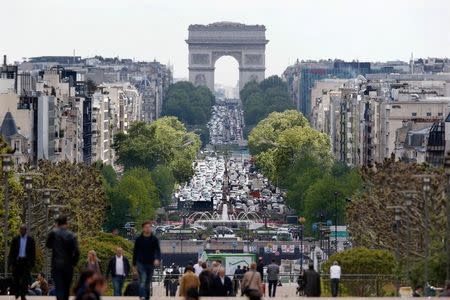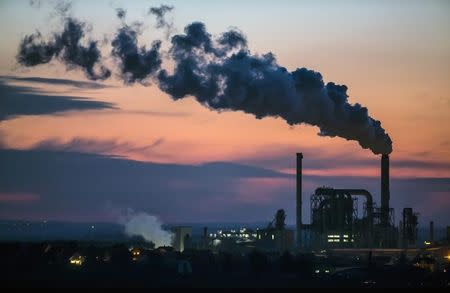France outpaces Britain, Germany with fastest growth in two years
By Ingrid Melander and Michel Rose PARIS (Reuters) - Cheap oil and a weak euro helped France's economy expand at its fastest rate in two years in the first quarter as consumers spent more freely, but the growth pickup was not sharp enough to generate extra jobs. Gross domestic product rose 0.6 percent quarter-on-quarter, twice the rate in Germany and in Britain - which both reported a slowdown - and beating economists' forecasts. The government said it would now beat its 2015 growth target. French exports slowed, however, and a depressed real estate market kept weighing on the euro zone's second-largest economy, the data from statistics office INSEE showed. Separate data on Wednesday showed the growth rate, accompanied by downward revisions of 0.1 percentage points to each of the previous two quarters, was not strong enough to stop a 0.1 percent contraction in first quarter non-farm payrolls. "The sharp acceleration in activity during the first quarter ... points to growth in 2015 being somewhat stronger than the 1.0 percent expected by the government," IHS Global Insight economist Diego Iscaro said. "However, we still do not estimate that the recovery will be strong enough to make a significant dent into France’s high unemployment rate". The jobless rate was 10.4 percent at the end of last year. President Francois Hollande, who will be hoping the improving economic outlook boosts his low approval rating, has said he will not run for a second mandate in 2017 if unemployment has not dropped by then. The government had based its 2015 budget on a 1 percent growth forecast but Finance Minister Michel Sapin told BFM television after the GDP report: "We will (now) be at more than 1 percent at year-end." SLOWER Q2 The economy eked out only 0.2 percent growth last year, a figure INSEE cut on Wednesday from a previous 0.4 percent estimate. Business investment, at its best since the second quarter of 2008, underpinned the government's optimism. An INSEE survey of industrial company managers showed last week they expected to increase investment 7 percent this year, the most since 2011. With consumer confidence at its highest in more than five years, consumer spending rose 0.8 percent in the quarter. But household investment contracted for the seventh straight quarter, showing that real estate remains a drag on the economy. Another challenge for the government is France's high debt level, which INSEE revised up to 95.6 percent of GDP from a previous 95.0 percent. The Bank of France which, like analysts polled by Reuters, had forecast 0.4 percent growth for the first quarter, said earlier this week that growth would slow to 0.3 percent in the second. Credit Agricole economist Axelle Lacan, who expects 1.2 percent growth overall in 2015, sees growth at 0.3 percent in the second quarter "as long as there isn't too much of a backlash from stock variations." Economists at Natixis said they see exports starting to contribute positively to growth in the second quarter and further buoyant consumption, "even if the effects of the oil price drop are waning." (Additional reporting by Yann Le Guernigou and Jean-Baptiste Vey; editing by Mark John and John Stonestreet)



